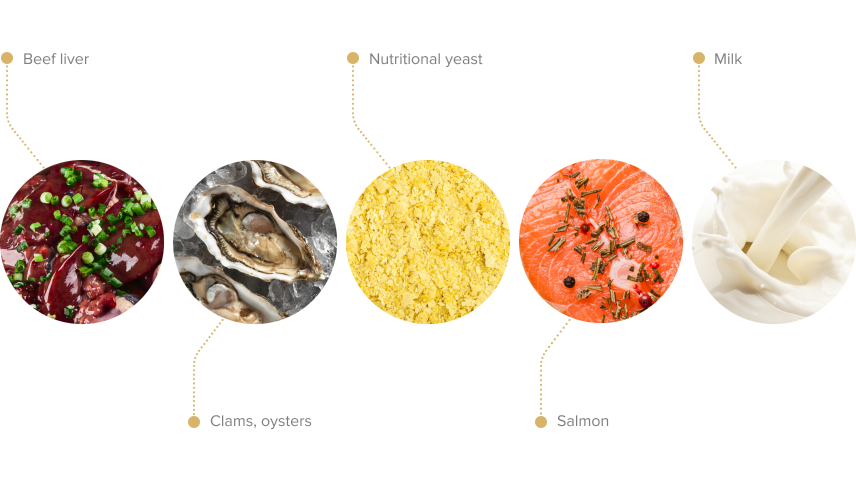Health Benefits of Vitamin B12

We all know that vitamins are essential. But how well do you know your vitamins? Vitamin B12 is an essential vitamin that people may overlook. However, it has key functions and benefits for the body. So, what is vitamin B12, where can you get it from and what does it do?
What is vitamin B12 and what does it do?
Vitamins are essential nutrients that the body needs for proper functioning. We must get them from foods. There are two main groups of vitamins: fat-soluble vitamins and water-soluble vitamins. Getting sufficient water-soluble vitamins daily is important, as we cannot store them.
The two main water-soluble vitamins are vitamin C and vitamin B.
You may have heard of vitamin B. Vitamin B exists as a group of water-soluble vitamins. There are eight water-soluble vitamins, including:
- Vitamin B1. Also known as thiamine, it's vital for making energy in the cells.
- Vitamin B2. Also known as riboflavin, it’s a part of energy production and takes part in redox reactions in the body.
- Vitamin B3. Also known as niacin, it is also needed for energy production.
- Vitamin B5. Also known as pantothenic acid, it is required in order to produce energy and make hormones.
- Vitamin B6. Also known as pyridoxine, it is vital for healthy red blood cells.
- Vitamin B7. Also known as biotin, it is needed for metabolizing proteins, carbs and fats.
- Vitamin B9. It is key for making DNA, also known as folate or folic acid. This vitamin is essential during pregnancy and is needed for the healthy development of the fetus.
- Vitamin B12. Also known as cobalamin, it is essential for red blood cell formation and our nervous system.

Vitamin B12 is a key player in our health and well-being. But what does it do in the body? Vitamin B12 helps us make DNA and RNA. It is needed for the function of a specific enzyme called methionine synthase, which helps make the building blocks of DNA and RNA. Vitamin B12 is necessary for healthy blood cells and the development and function of brain and nerve cells.
How much vitamin B12 you should get depends mainly on your age. For those aged over 14, 2.4 micrograms a day is sufficient. People who are pregnant or lactating require a higher amount of the vitamin. The recommended dietary allowance for pregnant people is 2.6 micrograms, while for lactating people, it is 2.8 micrograms.
What happens if you don’t get enough of the vitamin? Deficiency of vitamin B12 may lead to your red blood cells not developing correctly. This is associated with a range of symptoms, including:
- Feeling tired or lacking energy, feeling weak in the muscles
- Losing weight, decreased appetite
- Mood changes like irritability
- Tingling or numbness in the hands and feet
- Loose stool
- Smooth and tender tongue
Certain factors may lead to a vitamin B12 deficiency. These include being vegan since the vitamin isn't found in plant sources. Other factors include certain health conditions, lack of stomach acid, and surgeries or issues with the intestine. Some medications may also lead to a decrease in vitamin B12 levels due to lowered absorption.
A lack of vitamin B9, or folate, may also cause these symptoms. Therefore, it's important to consult with medical professionals if you suspect any deficiency. Remember that a blood test is the best way to find out if you're low in vitamin B12. Your medical professional will be able to carry out the relevant tests and help you find strategies to include more of the vitamin in your daily meals.
What foods provide vitamin B12?
Ensuring your intake of vitamin B12 requires understanding what foods contain the vitamin. It turns out that vitamin B12 is relatively easy to get if you eat animal products. Some of the best foods for vitamin B12 are fish, meats, and poultry. For vegetarians who eat dairy and eggs, these are also excellent sources of vitamin B12. Dairy products like milk, cheese and yoghurt all contain the vitamin.
Some of the top sources of vitamin B12 include beef liver, clams, oysters, nutritional yeast, salmon, and milk.

For those who are vegan, getting enough vitamin B12 may be a more significant challenge. Plant foods don't tend to contain the vitamin. Therefore, your best bet on getting foods rich in vitamin B12 is to choose fortified foods. These include fortified breakfast cereals and nutritional yeast.
You can also get supplements to help you meet your vitamin B12 intake. You may be able to find supplements containing only vitamin B12. Commonly, the supplements will contain all the B-group vitamins and be called a B-complex.
What are some effects of vitamin B12 on health?
It’s essential to get enough vitamin B12 for health. But what are some of the benefits of vitamin B12?
May Benefit People with Depression
Insufficient vitamin B12 intake can be associated with changes in mood, including irritability and feelings of sadness. For those managing depression, having enough vitamin B12 and folate can be important for properly responding to anti-depressants. That's because vitamin B12 supports proper levels of homocysteine, which is an amino acid that affects neurotransmitters implicated in depression.
It appears that getting sufficient vitamin B12 may help manage depression alongside medication and may delay its onset. We're still learning more about the connection between vitamin B12 and depression.
May support bone health
Ensuring we have strong bones is important for our quality of life, especially as we age. Vitamins B12 and folate appear to affect bone strength and mineral density. They're also important for keeping homocysteine levels down. Homocysteine may affect collagen structure and the activity of bone remodeling cells, which may affect bone density. Getting enough of these vitamins appears important for our musculoskeletal system.

May support healthy hair, skin, and nails
Vitamin B12 may affect our skin, nails, and hair. Lack of the vitamin can manifest itself through hyperpigmentation, linear streaks on nails, and even changes in hair. The changes may be due to an increase in melanin production, but we're still learning more about exactly how vitamin B12 affects our skin, nails, and hair. Luckily, many of the dermatological manifestations of vitamin B12 deficiency may resolve with adequate nutrition.
May benefit your brain and memory
Vitamin B12 is essential for a healthy brain and cognition. Insufficient vitamin B12 appears to increase homocysteine and another compound called methylmalonate, which may affect our brain and cognition. In addition, insufficient intake may increase the risk of cognitive and memory decline.
Those with an existing deficiency may find that cognition improves when they get adequate vitamin B12. However, more studies are needed to confirm the connection.
How to Take B12
You should aim to get vitamin B12 from foods. That way, you will also get all the other beneficial nutrients that the food contains. It's good to know how much vitamin B12 common foods contain so that you can approximate how much of it you're getting.
Organ meats are excellent sources of the vitamin. One hundred grams of cooked beef liver contains around 70.6 micrograms of the vitamin, which is more than sufficient to meet your daily requirements.
Shellfish and fish are another great option. One hundred grams of cooked clams contains 99 micrograms of vitamin B12 and one hundred grams of canned sardines has 8.94 micrograms of vitamin B12.
You can use the labels on your food items to determine precisely how much vitamin B12 you're getting.
If you can't meet your requirements through foods or if you're on a vegan diet, you can get your necessary dosage of vitamin B12 through supplements. Vitamin B12 supplements can conveniently provide the vitamin on their own. Alternatively, you can get a B-complex supplement, which contains all of the B-group vitamins.
The best supplement for vitamin B12 will meet all of the following criteria:
- Has a high quality. You want to make the best out of the supplements you get. Therefore, pick those with a high quality. Look for manufacturers and brands that are open about their quality standards and checks. Ideally, find third-party tested supplements if you can. At Maxler, all of our supplements are made in IFS and GMP-certified factories, ensuring their quality.
- Has the correct dosage. It's a good idea to pick a sufficiently high dosage supplement for your purposes. That way, you can ensure that your intake is always sufficient.
- Meets your dietary requirements. Supplements are important if you're on a restricted diet. Therefore, ensure that your supplement meets your requirements. If you're unsure whether a supplement is vegan, gluten-free, or halal, contact the manufacturer.
- It easily fits into your routine. It can be hard to get what you need when you need it. Therefore, think about how your supplement will fit into your routine. Some people may prefer tabs due to their convenience. Others may prefer powders or effervescent supplements because of their ease of use and versatility. Remember that you'll need to be consistent with your supplement intake, so pick one that you enjoy and can easily integrate into your day.
If you’re looking for B12 supplements, look no further than Maxler’s vitamin and mineral line. Our vegan B-complex provides all the required B-group vitamins for your health. Alternatively, try our best-selling VitaMen and VitaWomen multivitamin complexes. They contain all the vitamin B12 and other potent plant components for optimal well-being.
Vitamin B12 is a crucial water-soluble vitamin that the body needs for healthy red blood cells and DNA synthesis. It's important to get this vitamin from foods. It's mainly found in animal products; however, you can get it from fortified foods and supplements as well. Getting enough vitamin B12 is key for a healthy body. Therefore, make sure you're including sources of the vitamin on a daily basis.




